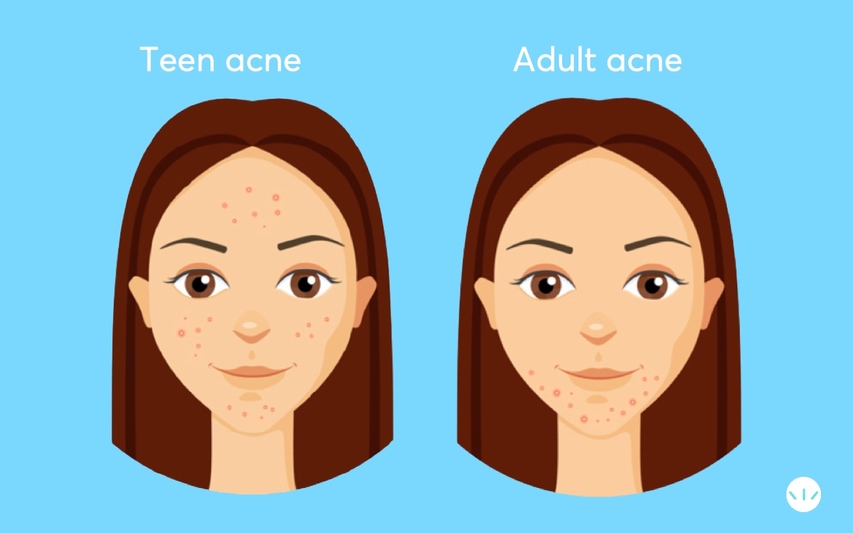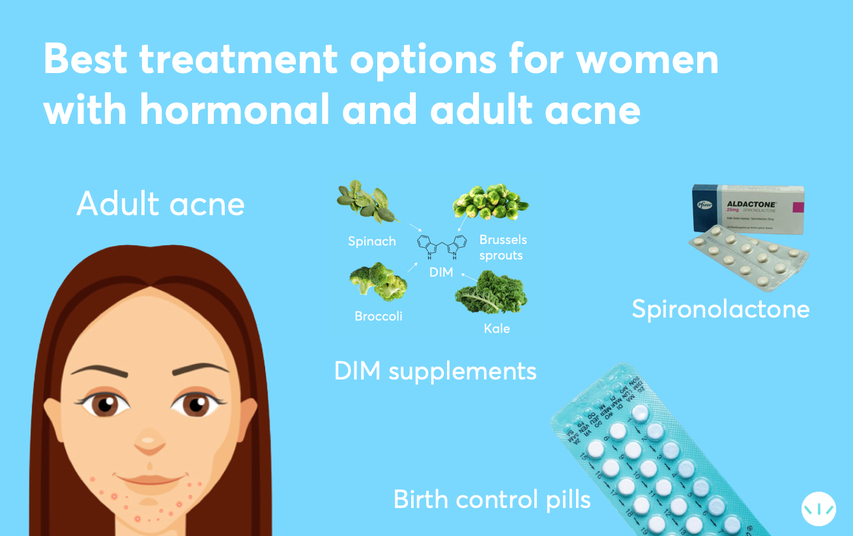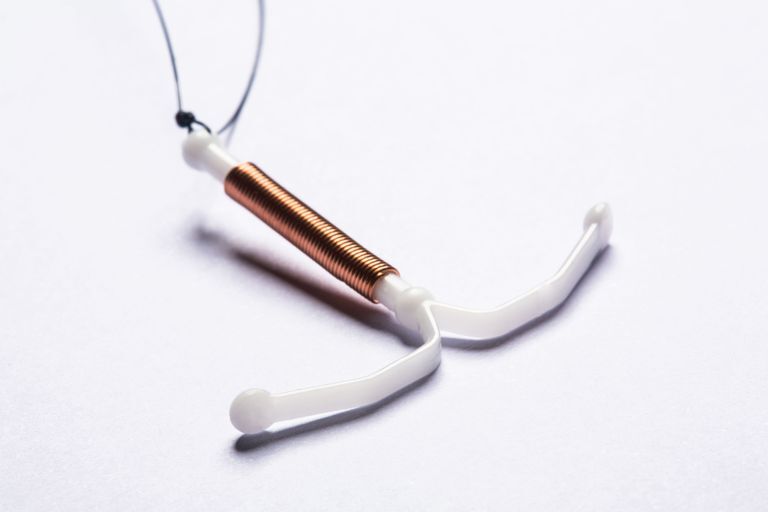Best birth control pills for women with hormonal acne
How Common is Hormonal Acne?
If you’re dealing with hormonal acne, you’re not alone! Hormonal acne is highly prevalent, particularly among women in their 20s and 30s. Research shows that up to 50% of women in this age group with adult acne experience hormonal influences on their breakouts.
How to Identify Hormonal Acne
Hormonal acne can often be identified by its location on the face and the timing of breakouts.
Where does hormonal acne appear?
While teenage acne typically affects the forehead and cheeks, hormonal acne tends to occur on the lower face, particularly around the mouth, jawline, and neck.
When do hormonal acne breakouts happen?
Hormonal acne is closely tied to the menstrual cycle. Many women experience flare-ups during ovulation (mid-cycle) or just before and during menstruation, as these times are marked by significant hormonal fluctuations. Increased progesterone during ovulation stimulates sebum production, clogging pores. Before menstruation, the drop in estrogen and progesterone leads to even higher sebum production, often triggering more inflamed breakouts.
Women with hormonal imbalances may experience exaggerated skin changes, resulting in more severe, inflamed, and recurring acne.

Best Treatments for Hormonal Acne
Managing hormonal acne often requires a combination of medical-grade topical treatments and oral therapies.
Topical Treatments:
- Benzoyl Peroxide: Reduces bacteria and inflammation.
- Salicylic Acid: Helps unclog pores.
- Retinol: Promotes cell turnover and reduces acne.
- Niacinamide: Calms inflammation and strengthens the skin barrier.
Oral Treatments:
- Birth Control Pills: Regulate hormonal fluctuations.
- Spironolactone: Blocks androgen effects to reduce oil production.
- Non-Hormonal Supplements (e.g., DIM): Help balance hormones naturally.

How Birth Control Can Help
How does birth control treat hormonal acne?
Certain types of birth control regulate hormones that contribute to acne. They work by:
- Suppressing androgen production.
- Blocking androgen receptors.
- Increasing SHBG (sex hormone-binding globulin), which reduces free testosterone levels.
Best Birth Control for Acne:
Combination pills containing both estrogen (usually Ethinyl Estradiol) and low-androgenic progestins (e.g., drospirenone, norgestimate, desogestrel) are most effective. Popular brands include:
- Yaz, Yasmin, and Beyaz: Drospirenone and Ethinyl Estradiol.
- Ortho Tri-Cyclen: Norgestimate and Ethinyl Estradiol.
- Estrostep Fe: Norethindrone and Ethinyl Estradiol.
Birth Control to Avoid:
Avoid progestin-only mini-pills and contraceptives with high-androgenic progestins (e.g., levonorgestrel, norethindrone) as they may worsen acne. Options like Depo-Provera, Skyla, and Nexplanon are also more likely to trigger breakouts.
Risks of Birth Control Pills
While birth control can help with acne, there are potential side effects, including:
- Increased risk of blood clots.
- Weight gain.
- Mood changes.
- Breast tenderness.
These risks should be carefully considered and discussed with a healthcare provider.
Balancing Hormones Without Birth Control
For women who prefer not to use hormonal birth control, other treatments can effectively balance hormones:
- Spironolactone: A diuretic and androgen blocker that reduces oil production and acne without affecting hormone levels.
- DIM Supplements: Derived from cruciferous vegetables (like broccoli and kale), DIM helps balance estrogen levels and reduce hormonal breakouts, particularly on the chin and jawline.
Choosing the Right Birth Control for Acne
Selecting the right birth control requires considering how different options affect your hormones and skin. Options include pills, patches, IUDs, or non-hormonal methods like copper IUDs (Paragard), which do not affect acne.
For women prone to hormonal acne, combination pills with drospirenone and Ethinyl Estradiol are often the best choice. It’s essential to monitor your skin and any side effects, and consult your OB/GYN to find the best fit.
Final Thoughts
Hormonal acne can be effectively managed with a combination of topical treatments, oral medications, and hormone-regulating options like birth control or supplements. Whether you opt for hormonal therapy or natural alternatives, finding the right solution may take some trial and error. Always consult your healthcare provider to ensure the treatment plan is tailored to your needs and skin type.
With patience and the proper care, achieving clearer, healthier skin is possible!
More info:
DIM - Best natural supplements to balance your hormones and help with adult acne
Effect of birth control pills on acne in women
Spironolactone for acne – read this first!
References:
Hormonal treatment of acne vulgaris: an update.
Use of oral contraceptives for the management of acne
Combined oral contraceptive pills for the treatment of acne
To find the right acne treatments for your unique skin, take the free skin assessment by clicking here.





